COMMUNICATION MANAGEMENT REPORT TX/RX
A Communication Management Report can be printed either automatically or manually.
You can set the machine to print the report when the number of send and receive jobs reaches 100. Also, you can set the report to be printed when a specified time is reached. The send and receive logs can also be printed separately.
The items printed for the report and a description of each item are indicated below.
DEPT. ID
If Department ID Management is set, the Department ID is printed. Transmission logs are listed according to Department ID.
ST. TIME
The date and time (in 24-hour notation) at which the document started to be transmitted or received are printed. An asterisk (*) indicates a job that has already been printed. If SSO-H is set as the login service, the user name used for login is printed below the set time. When the machine cannot specify the user (for example, when automatically forwarding), the user name is not printed.
DESTINATION ADDRESS
The address of the recipient is printed.
If the job is sent to a file server (FTP, SMB, or WebDAV):
The path name is printed on the second line.
If the job is sent via fax:
The subaddress is printed on the second line.
|
NOTE
|
|
If Access Management System is enabled when a logged in general user prints a Communication Management Report, jobs performed by other users are printed with "***" in the Destination Address, Subaddress, and Folder Path columns. To see information in the Destination Address, Subaddress, and Folder Path columns, log in as an administrator.
|
DESTINATION ID
The name of the recipient is printed.
|
NOTE
|
|
If Access Management System is enabled when a logged in general user prints a Communication Management Report, jobs performed by other users are printed with "***" in the Destination ID column. To see information in the Destination ID column, log in as an administrator.
|
JOB NO.
The four digit number, that is automatically assigned when the document is accepted for sending or receiving, is printed.
Numbers between 0001 and 4999 are for sending, while numbers between 5001 and 9999 are for receiving.
COMM. MODE
The type and mode of transmission are printed.
Transmission type: Send (TX), Receive (RX)
Mode of transmission: FTP, SMB, WebDAV, I-Fax (I-FAX), E-mail (E-MAIL), G3, ECM
PGS.
The number of pages that were sent or received is printed.
RESULT
Prints "OK," "NG," or "--."
If a send job is cancelled, <STOP> is printed in the Results column.
|
OK:
|
Sending was completed successfully. The communication time is also printed next to "OK."
|
|
NG:
|
Sending failed. The communication time and error code are also printed next to "NG."
|
|
--:
|
The machine was unable to confirm whether the e-mail message or I-fax you sent was actually delivered to the server or destination.
|
|
NOTE
|
|
A list of fax, e-mail, I-fax, and file server transmission logs is printed on the Communication Management Report.
If a field exceeds its display capacity, only those characters that fit in the display are printed.
|
Automatically Printing the Communication Management Report
The Communication Management Report can be automatically printed.
1.
Press  (Settings/Registration).
(Settings/Registration).
 (Settings/Registration).
(Settings/Registration). 2.
Press [Function Settings] → [Send] → [Common Settings].
3.
Press [Communication Management Report].
4.
Specify each setting → press [OK].
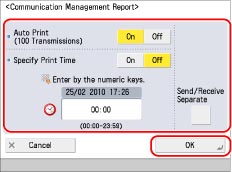
<Auto Print (100 Transmissions)>:
Press [On] to automatically print the Communication Management Report when the number of send and receive transmissions reaches 100.
<Specify Print Time>:
To print the report at a specified time, press [On] → enter the time using  -
-  (numeric keys).
(numeric keys).
 -
-  (numeric keys).
(numeric keys).Enter all four digits of the time (including zeros), using 24-hour notation.
|
Examples:
|
7:05 a.m. → 0705
|
|
11:18 p.m. → 2318
|
If you make a mistake when entering the time, press  (Clear) to clear your entry → enter another four digit number.
(Clear) to clear your entry → enter another four digit number.
 (Clear) to clear your entry → enter another four digit number.
(Clear) to clear your entry → enter another four digit number.If the number of send and receive transmissions exceeds 100 before the specified time, a Communication Management Report of the most recent 100 transmissions is printed.
To print the send and receive logs separately, press [Send/Receive Separate] to select it.
Manually Printing the Communication Management Report
You can manually print the Communication Management Report.
1.
Press [Status Monitor/Cancel].
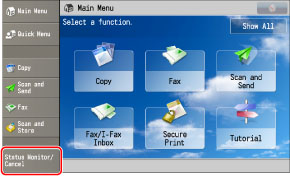
Printing the Send History:
Press [Send] → [Log].
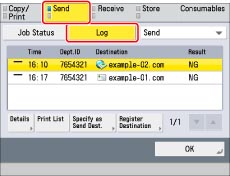
Select the desired setting from the drop-down list → press [Print List].
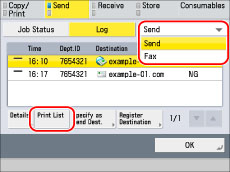
|
NOTE
|
|
To print the send history for the Fax Activity Report, select [Fax] in the drop-down list. (See "FAX ACTIVITY REPORT TX/RX.")
|
Printing the Reception History:
Press [Receive] → [Log].
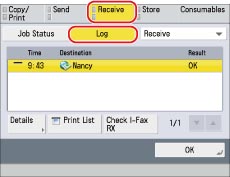
Select the desired setting from the drop-down list → press [Print List].
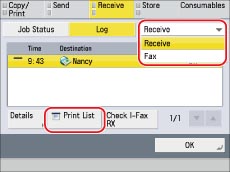
|
NOTE
|
|
To print the reception history for the Fax Activity Report, select [Fax] in the drop-down list. (See "FAX ACTIVITY REPORT TX/RX.")
|
2.
Press [Yes].
3.
Press [OK].
|
NOTE
|
|
If [Display Log] in [Management Settings] (Settings/Registration) is set to 'Off', [Communication Management Report] is not displayed.
If [Display Log] in [Management Settings] (Settings/Registration) is changed from 'Off' to 'On', the following settings are switched to 'Off' automatically:
Auto Print (100 Transmissions)
Specify Print Time
A list of e-mail, fax, I-fax, file server transmission logs, and ECM transmission logs is printed on the Communication Management Report.
When the message <Check the printer. Call service representative.> is displayed to indicate that the Print function is unavailable, the machine automatically prints a Communication Management Report after it recovers from the problem. The latest 100 communication logs are printed on the report.
|